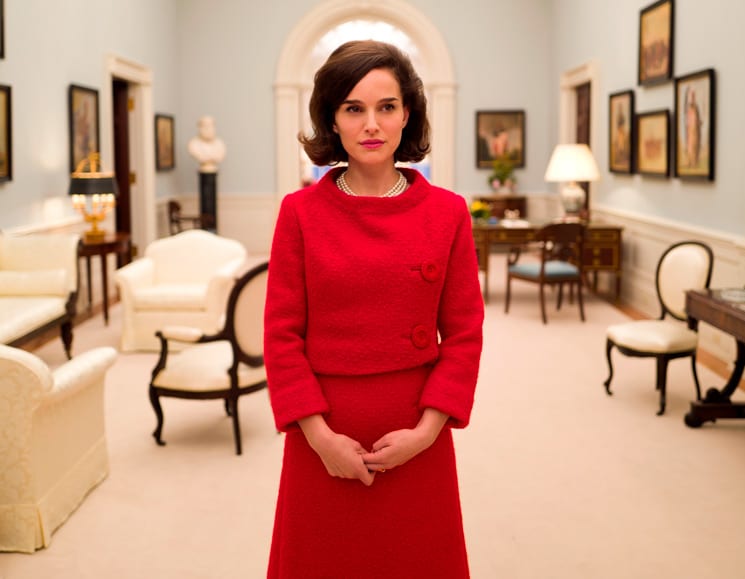How one dies impacts their legacy just as much as how they lived.
It's a statement that 2016 proved time and time again — look no further than the way David Bowie and Leonard Cohen's final albums shaped the discussions of their deaths — but also one central to the story of Jackie, the biopic depicting First Lady Jacqueline Kennedy in the days following the assassination of her husband, President John F. Kennedy. While the country mourned the loss of their leader, the future Jackie O deliberately engineered his funeral procession and burial with his legacy and remembrance in mind — she wanted her spouse to be remembered not for how he died, but for what he did while he lived.
A haunting sense of realism is present throughout the film, largely due to Natalie Portman's performance in the titular role. She shines here, from her skilful oscillation between quivering grief and stern stoicism down to her pitch-perfect transatlantic accent. Her Kennedy is a deeply complex, compelling woman thrust into the spotlight, who eventually learns to manipulate it to her advantage.
Though Noah Oppenheim's script dates back to 2010, long before the 2016 American presidential election, the film's timely release showcases both the cyclical nature of modern politics and the necessity of keeping a critical eye on the media that reports on them. The film is framed by an interview between Kennedy and journalist Theodore H. White, as portrayed by Billy Crudup, and these scenes examine the role of truth in journalism. The inclusion of Kennedy's well documented, on-the-fly editorializing of White's real-life piece gives the film more depth, and is particularly timely following a contentious and precedent-smashing presidential election that established "post-truth" as the word of the year.
Cinematically, the film also excels: Stéphane Fontaine's cinematography and Mica Levi's (of Micachu and the Shapes) score are sparse and sweeping; the film jumps around through the week of the assassination, but the strong filmic elements anchor the viewer throughout it all. And yet, one of the film's many strengths is also its restraint: it remains rooted in the week of the assassination, with no foreshadowing as to what would befall brother-in-law Bobby or the fallout of White's finished article, and never strays from Jackie as the film's star. The film conveys universal consequences without needing to fortune-tell, and Portman's Kennedy is more than sufficient as a lens for relatable personal and political issues.
Jackie delicately weaves tension between death and legacy with that of the media and politics, told through one of the 20th Century's most important events. Impeccably recreated and tastefully executed, Jackie is an important film that looks to the past as we navigate a tense future.
(Searchlight Pictures)It's a statement that 2016 proved time and time again — look no further than the way David Bowie and Leonard Cohen's final albums shaped the discussions of their deaths — but also one central to the story of Jackie, the biopic depicting First Lady Jacqueline Kennedy in the days following the assassination of her husband, President John F. Kennedy. While the country mourned the loss of their leader, the future Jackie O deliberately engineered his funeral procession and burial with his legacy and remembrance in mind — she wanted her spouse to be remembered not for how he died, but for what he did while he lived.
A haunting sense of realism is present throughout the film, largely due to Natalie Portman's performance in the titular role. She shines here, from her skilful oscillation between quivering grief and stern stoicism down to her pitch-perfect transatlantic accent. Her Kennedy is a deeply complex, compelling woman thrust into the spotlight, who eventually learns to manipulate it to her advantage.
Though Noah Oppenheim's script dates back to 2010, long before the 2016 American presidential election, the film's timely release showcases both the cyclical nature of modern politics and the necessity of keeping a critical eye on the media that reports on them. The film is framed by an interview between Kennedy and journalist Theodore H. White, as portrayed by Billy Crudup, and these scenes examine the role of truth in journalism. The inclusion of Kennedy's well documented, on-the-fly editorializing of White's real-life piece gives the film more depth, and is particularly timely following a contentious and precedent-smashing presidential election that established "post-truth" as the word of the year.
Cinematically, the film also excels: Stéphane Fontaine's cinematography and Mica Levi's (of Micachu and the Shapes) score are sparse and sweeping; the film jumps around through the week of the assassination, but the strong filmic elements anchor the viewer throughout it all. And yet, one of the film's many strengths is also its restraint: it remains rooted in the week of the assassination, with no foreshadowing as to what would befall brother-in-law Bobby or the fallout of White's finished article, and never strays from Jackie as the film's star. The film conveys universal consequences without needing to fortune-tell, and Portman's Kennedy is more than sufficient as a lens for relatable personal and political issues.
Jackie delicately weaves tension between death and legacy with that of the media and politics, told through one of the 20th Century's most important events. Impeccably recreated and tastefully executed, Jackie is an important film that looks to the past as we navigate a tense future.
